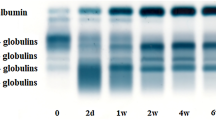Abstract
Since the introduction of Starch-gel electrophoresis by Smithies1, the intraspecific polmorhisms of several types of iron-binding B-globulins (transferrins) int the sera of different species of farm animals have been examined by a number of workers. In sheep the number and frequency of the transferrins have been found to vary from one breed to another: Ashton2 and Ashton and Ferguson3 have reported as many as five to seven zones in any one breed. This communication deals with the results of a preliminary investigation of serum tranferrin polymorphism in the desert sheep of the sudan.
This is a preview of subscription content, access via your institution
Access options
Subscribe to this journal
Receive 51 print issues and online access
$199.00 per year
only $3.90 per issue
Buy this article
- Purchase on Springer Link
- Instant access to full article PDF
Prices may be subject to local taxes which are calculated during checkout
Similar content being viewed by others
References
Smithies, O., Biochem. J., 61, 629 (1955).
Ashton, G. C., Nature, 182, 370 (1958).
Ashton, G. C., and Ferguson, K. A., Gen. Res. (Camb.), 4, 240 (1963).
Author information
Authors and Affiliations
Rights and permissions
About this article
Cite this article
OSMAN, H. Serum Transferrin polmorphism in the Desert sheep of the Sudan. Nature 215, 162–163 (1967). https://doi.org/10.1038/215162a0
Issue Date:
DOI: https://doi.org/10.1038/215162a0
Comments
By submitting a comment you agree to abide by our Terms and Community Guidelines. If you find something abusive or that does not comply with our terms or guidelines please flag it as inappropriate.



